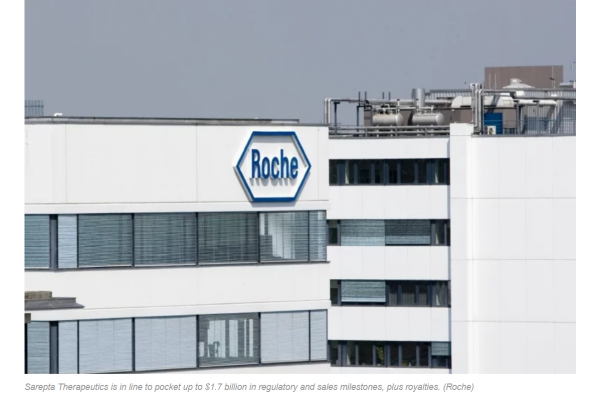Roche to pay Sarepta $1B upfront for DMD gene therapy rights
December 24, 2019
Source: drugdu
 477
477
Roche is paying more than $1 billion upfront for the ex-U.S. rights to Sarepta Therapeutics' Duchenne muscular dystrophy (DMD) gene therapy SRP-9001. The deal comes days after Roche advanced its push into gene therapies by closing the takeover of Spark Therapeutics.
Sarepta has linked SRP-9001 to microdystrophin expression levels of up to 96% in early clinical tests, leading it to start a 24-patient placebo-controlled trial that is due to deliver data next year. Coupled to a safety profile that so far makes SRP-9001 look a better prospect than rival gene therapies from Pfizer and Solid Biosciences, the efficacy data have put Sarepta at the forefront of efforts to develop a one-shot treatment for DMD.
That has attracted the attention of Roche. The Swiss drugmaker is set to pay $750 million in cash and $400 million in equity upfront for the ex-U.S. rights to SRP-9001. Sarepta is also in line to pocket up to $1.7 billion in regulatory and sales milestones, plus royalties. Roche will pay half of global clinical development costs, although Sarepta will continue to handle the trials and manufacturing.

The size of the figures involved for just ex-U.S. rights suggests Roche thinks there is a big market for SRP-9001 and potentially points to ongoing competition for gene therapies. Sarepta’s first approved DMD treatment, Exondys 51, racked up sales of $281 million over the first nine months of 2019.
At Roche, SRP-9001 will slot into an emerging portfolio of gene therapies. After multiple delays, Roche closed its $4.3 billion takeover of Spark last week, giving the Swiss pharma a pipeline of gene therapies and infrastructure for developing and manufacturing them.
The Sarepta deal also gives Roche an option to acquire the ex-U.S. rights to "certain future DMD-specific programs." Roche will pay further milestones and royalties, plus a share of the costs, if it takes up the option. Roche was hoping to use myostatin inhibitor RG6206 to challenge for the DMD market, but it pulled the plug on the ex-Bristol-Myers Squibb program last month.
Analysts at Cantor said that, in terms of ex-US rights: “We think that this deal represents one of the largest in a while and certainly biggest in gene therapy.”
By editor
Read more on
- Driven by drugs for lowering blood sugar and losing weight, the export value of Chinese Western medicine preparations has reached a record high February 2, 2026
- Chengdu Pioneer and Kangzhe Pharmaceutical have reached a cooperation agreement to leverage the DEL and HAILO platforms to empower the development of multi-target innovative drugs February 2, 2026
- J&J’s subcutaneous monoclonal antibody combination therapy receives further FDA approval; Autoimmune CAR-T therapy granted FDA Breakthrough Therapy Designation February 2, 2026
- Why is the development of AI-based antiviral drugs a niche field yet a necessity? February 1, 2026
- Pakistan issues final antidumping ruling on Chinese cephalosporin February 1, 2026
your submission has already been received.
OK
Subscribe
Please enter a valid Email address!
Submit
The most relevant industry news & insight will be sent to you every two weeks.



